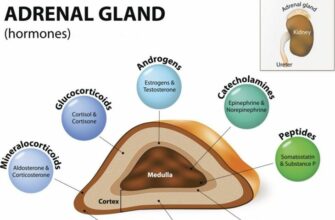Progeria or Hutchinson-Gilford syndrome is a rare genetic disorder that causes children to age much more quickly than average. Often, signs and symptoms begin to appear when the child is one or two years old. The disorder is progressive, meaning it gets worse as time goes on. There is currently no cure for progeria, but doctors are making some advancements in treatment options.
Causes of Progeria
Doctors have discovered that a gene in the body called Lamin A (LMNA) is responsible for progeria. This gene produces a protein that is essential for holding cells in the body together. If Lamin A mutates, it produces a protein called progerin that can make cells in the body volatile. These volatile cells are thought to be the cause of progeria in children. Researchers believe progeria is unlikely to be passed down from parents to children since it is so incredibly rare.
Symptoms of Progeria
Visible symptoms of children with progeria include a head that seems too large for the face and slow growth. Hair loss is common with progeria, so a child with this condition may not grow as much hair as they should, or will start to lose hair at an early age. Other symptoms include visible veins and thinning skin causing wrinkles. A narrow face with a thin lower jaw, thin lips, and a high-pitched voice are also signs of progeria.
Health Concerns
Cardiovascular disease is common with progeria. This condition can cause damage to the heart and blood vessels. A few other concerns include stiff joints, fragile bones, hearing loss, and insulin resistance. Abnormal or delayed tooth growth is another health concern. Although most of these issues come with old age, children with progeria age at an extremely rapid rate, which results in some of these health concerns.
Complications
Progeria is often fatal. Sadly, the life expectancy for children diagnosed with progeria is very low, often between 13 and 20 years. Children can develop a condition called atherosclerosis or hardening of the blood vessels, resulting in blood clots, heart attacks, and congestive heart failure. Problems with blood flow to the brain are also common with progeria and can result in stroke.
Diagnosis
Medical providers diagnosis of progeria through blood testing and the presence of symptoms. The blood test looks for mutations in the LMNA gene. The doctor measures the child’s height and weight and tests hearing and vision. They record all vital signs like heartbeats per minute, blood pressure, and oxygen levels. By comparing these results to national averages, the doctor can identify abnormalities.
Treatment for Progeria
There is no cure for progeria, but the doctor can treat the symptoms of the condition. Children with progeria undergo routine testing such as dental checkups, hearing and vision tests, echocardiograms, and x-rays so any changes can be quickly noted and addressed. Progeria is different for every child. Treatments may include medications, physical therapy, consulting a dietician, and routine dental appointments.
When to See A Doctor
Parents should make an appointment with a doctor when they begin to notice physical changes in their child, such as hair loss, lack of growth, veins that are visible, or skin that looks thin or wrinkly. Pain in the joints and trouble hearing or seeing are other signs to note. Progeria is normally found during routine appointments, though the physician will run the tests noted above to confirm if progeria or another issue is causing the symptoms.
Progeria Research
Doctors are researching all avenues to find ways to treat progeria and increase the life expectancy of children who have it. They seek to gain a better understanding of the genes that cause the condition and figure out how it progresses in every case. They are also doing clinical trials for medications typically used in cancer treatment. These medications are thought to help strengthen the blood vessels, resulting in fewer deaths from illnesses like cardiovascular disease and strokes.
Support for Progeria
Receiving a diagnosis of progeria can be devastating for everyone involved. A therapist can help family members learn coping mechanisms and techniques; doctors may recommend counseling for the whole family to help gain a better understanding of what will happen in the future. The Progeria Research Foundation is an excellent resource for families and can connect them with others who are going through the same thing.
Helping Children with Progeria
As a child with progeria ages, he or she will start to notice physical differences not seen in other children, so ensuring the child has a full and sensitive understanding of progeria is essential. Doctors, therapists, and familial support will be vital in helping the child come to terms with their condition.

 Home
Home Health
Health Diet & Nutrition
Diet & Nutrition Living Well
Living Well More
More




















